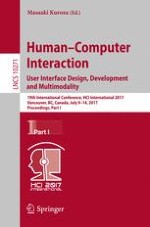2017 | OriginalPaper | Buchkapitel
Acceptance of Automated Driving Across Generations: The Role of Risk and Benefit Perception, Knowledge, and Trust
verfasst von : Carley Ward, Martina Raue, Chaiwoo Lee, Lisa D’Ambrosio, Joseph F. Coughlin
Erschienen in: Human-Computer Interaction. User Interface Design, Development and Multimodality
Aktivieren Sie unsere intelligente Suche, um passende Fachinhalte oder Patente zu finden.
Wählen Sie Textabschnitte aus um mit Künstlicher Intelligenz passenden Patente zu finden. powered by
Markieren Sie Textabschnitte, um KI-gestützt weitere passende Inhalte zu finden. powered by
